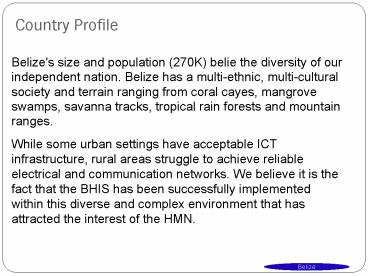Country Profile - PowerPoint PPT Presentation
1 / 9
Title:
Country Profile
Description:
Belize has a multi-ethnic, multi-cultural society and terrain ranging from coral ... Historically Belize had a discontinuous health care system with service overlaps ... – PowerPoint PPT presentation
Number of Views:275
Avg rating:3.0/5.0
Title: Country Profile
1
Country Profile
- Belize's size and population (270K) belie the
diversity of our independent nation. Belize has a
multi-ethnic, multi-cultural society and terrain
ranging from coral cayes, mangrove swamps,
savanna tracks, tropical rain forests and
mountain ranges. - While some urban settings have acceptable ICT
infrastructure, rural areas struggle to achieve
reliable electrical and communication networks.
We believe it is the fact that the BHIS has been
successfully implemented within this diverse and
complex environment that has attracted the
interest of the HMN.
Belize
2
Drivers for health system strengthening (HSS)
- Historically Belize had a discontinuous health
care system with service overlaps and gaps, a
poor distribution of medical resources including
drugs, supplies and HR. - Some budget lines involved in excess of 50
wastage. - Patterns of resource utilization were poorly
characterized or not at all. - This set the stage for a political and clinical
imperative for reform.
Globally, the basic health encounter structure
has not evolved in 50 years. A system is needed
that recognizes the interdependence of individual
and public health and successfully achieves good
resolution at all degrees of magnification.
Belize
3
Drivers for HIS strengthening
- The former health information systems (2001) were
effectively data silos of limited use beyond
their subject area and of no holistic value. - A new HIS, most importantly, needed to be
reflective of our needs and
support evidence based decision making and best
practise care protocols provide mission critic
al on-demand services despite intermittent
network connectivity, and a severe climate
be sustainable, scalable, secure, OS and db inde
pendence, and role based permissions
be a one patient one record encounter centric s
ystem suited to both individual and public hea
lth concerns (which are not separate)
ensure seamless integration and data interoperab
ility and a flexible reports engine.
Belize
4
History of approaches, methods and projects to
HIS strengthening
- Health Sector Professionals demanded an HIS that
facilitated excellent care for each
patient-provider encounter, while also decreasing
error rates, supporting preventative protocols,
enabling comprehensive chronic non-communicable
disease management, and gaining firm control over
infectious diseases. - The search for an existing system capable of
capturing, storing and sharing mission critical
data in a low resource setting was unsuccessful. - Belize then engaged in Joint Application
Development to collectively define our needs. - The JAD sought requirements from all corners of
the nation and health sector. Belize then
embarked on an custom software development with
the JAD outcomes acting as the blueprint. - With input from SMEs the project continues to be
implemented in discrete phases so as to avoid a
shock to the system.
Software is tactical and component selection is
secondary to the organizational strategic
objectives.
Belize
5
Major Lessons Learned
- A national one patient one record encounter
centric health information system is possible. It
isn't theory we've done it! - Individual and Public Health are simply different
parts of the continuum that is a nation's
healthcare system. - Implementation must be phased (avoids paralysis
by analysis)? - Ideally installed within a single political
cycle - A Successful project requires unwavering
executive commitment. - Data should be captured as near to the source as
possible and then shared from that point
outward. - BHIS is akin to a zoom lens at wide angle it
offers a picture of the population and can also
focus on unique patients. - A proper feedback loop promotes a high quality
and quantity of collected data. - Hardware can not be expensive and must be
appliance like. - Adopting a systematic, holistic approach in the
development of HIS is an absolute must.
Belize
6
What we need from within the country to continue
and improve
- Executive leadership everyday and for the
long-term. - A legislative framework which is considerate and
supportive of the BHIS. - Standard Operating Procedures to promote
consistency in utilization. - Support of professional organizations and trade
unions. - Improved and expanded infrastructure.
- Deeper and wider adoption.
- Resources to sustain and expand the BHIS.
- Public relations and promotions.
- Patient identification cards.
Belize
7
What we need from the global community to
continue and improve
- Strategic Leadership
- Resources or partnerships to sustain and expand
the BHIS - Standards
- Measurement
- PHI Expertise help to use and analyze the data
we're collecting - Foster co-operation/knowledge sharing globally
and regionally - Support in implementing BHIS to other HMN
supportive nations the larger the user base the
better the software will become. - Action
Belize
8
Examples of what can be done now in Belize
- Monitor for Infectious Diseases like SARS and
Bird-Flu Country-Wide in real time - Track compliance with the Belize Diabetes
Management Program (visits, lab tests,
pharmaceuticals) for all Diabetics - Within minutes, identify all patients dispensed
medicine from a lot that has been flagged as
potentially unsafe - Systematic Country-Wide PMTCT program (Belize
is the only country in the world that has
achieved the WHO/PAHO target of 5 vertical HIV
transmission)
Belize
9
Contact information, references, resources
Mr. Ian Smith Information and Computer Service
s Manager ismith_at_health.gov.bz Michael Graven,
MD MSc MPH FAAP Faculty in Neonatology and Heal
th Informatics, Dalhousie University
Halifax, Nova Scotia, Canada Volunteer Senior Adv
iser for Health Affairs, Governments of
Belize and St. Lucia michael.graven_at_iwk.nshealth.
ca
- Hon. Pablo Marin
- Minister
- seniorsecretary_at_health.gov.bz
- Dr. Peter Allen
- Chief Executive Officer
- ceo_at_health.gov.bz
- Dr. Michael Pitts
- Director of Health Services
- mpitts_at_health.gov.bz
- Ministry of Health
- East Block, Independence Plaza,
- Belmopan, Belize, C.A.
- T 501 822 2059
- F 501 822 2942
Belize

